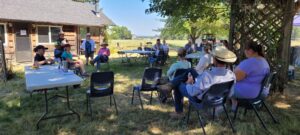Final report for RGR20-005
Project Information
The Northeastern Washington Soil Health Stewards (SHS) group was established in 2018 and is network of local producers interested in learning more about soil health, and increasing the adoption of practices that have been shown to improve soil health. Funding from the Research to Grassroots Grant will assist ten landowners in implementing previously-funded research projects on a site and context-specific scale in order to determine whether or not these practices are suitable for the region.
In order to increase understanding and awareness of the importance of soil health in the region the group will hold meetings, farm tours and a workshop to network and inform local landowners of soil health practices and ideas that may be successful in northeastern Washington. In 2021 2 virtual meetings, 2 farm tours, and 1 field day were held and planning has started for an annual meeting in February. The purpose of these meetings are to provide a place where producers can engage with other like-minded individuals, learn from experienced local growers and ag professionals, and receive feedback and support for their research projects. The group expects to grow from 10 to 30 participants over the duration of the grant. At the end of 2021 the group had grown to 67 members and had 58 posts on google groups platform. We will be considering shifting to Facebook for 2022 and the remainder of this grant to see if can expand further.
Workshops will be held on an annual basis that will be open to the public. These events will showcase research projects; host prominent local, regional and national speakers; and will provide other demonstrations that show local growers and the public the benefits of improving soil health. We expect attendance to these events to increase from 30 to nearly 100 participants by the end of the funding cycle.
Ten research projects will be implemented through the Research to Grassroots Grant. Most of these researchers will be farmers who are members of the SHS group. Five of these individuals will be given funds for research implementation, including supplies (seed, amendments, equipment rentals, and other purchases) and costs for conducting soil tests. Members who conduct research will report to the group in order to receive feedback and support from the group. In 2021 6 projects were completed with soil testing which started in 2020 5 winter bale grazing 4 with cost-share funding and 1 winter cover crop w/o livestock which received cost-share funding. Another 4 summer cover crop projects were started 2 completed with cost-share assistance, 1 without cost-share assistance and 1 withdrew project because of drought very poor germination rates landowner decided to do a conventional summer fallow. 3 of these projects has soil samples taken but issue with the lab requires resampling. Final reports are being worked on but not completed.
In summary, conservation district staff anticipate that this grant will enable local growers to increase their soil health knowledge and understanding, thereby improving the region's soil health.
Planning for 2022 we will have a small workshop in spring, hoping to bring more partners for a larger regional workshop this coming winter. 4-5 half day farm tours. Meetings or 1-2 hour events will depend upon ability to do inspersion will rely on outside farm tours. SCCD has applied for funding to cover soil health sample testing through the Washington Soil Health Imitative with the hope this will provide additional information on current SARE projects. Currently in the planning stage to install a couple of demonstration plots at the newly acquired WSU research farm in southern Stevens County and reaching out to additional landowners for 3-5 more small demonstration projects.
- Establish a baseline for soil health (knowledge) in the region
- All participants of the Soil Health Stewards group will complete a pre-survey to determine their current knowledge and to ask questions they may have concerning soil health. To determine a baseline for soil health, all research participants will conduct soil health and fertility testing before they implement new practices.
- Increase farmers' knowledge and acceptance of new soil health practices through experiential learning.
- Participants of the Northeastern Washington Soil Health Stewards (SHS) group will receive technical assistance and networking opportunities to learn more about previously-funded SARE projects and will apply them to the Northeastern Washington area.
- Group meetings and workshops will answer producers’ questions related to soil and plant health. Experienced local growers or technical assistance providers from other agencies (Washington State University, Washington State Department of Agriculture, the Western Cover Crop Council, and others) will provide expertise during workshops. Farmers will gain education and experience from a multitude of experience growers, ag professionals, and scientists, thereby improving their soil health knowledge.
- Conducting at least 10 research projects with trusted ag professionals a peers will provide producers the experience, technical support, and social capital they need to verify they adopt new soil health practices.
- Improve soil health (knowledge) throughout the Northeastern Washington region
- It is crucial for the successful adoption of soil health practices to reach out to at least half of the ag producers in the Northeast Washington region. By the end of the funding cycle, we will: increase SHS group membership from 10 to 30 participants; increase workshop attendance from 30 to 100 attendants; double the use of soil health practices (cover crops, rotational grazing, no-till pasture management, etc.) in the region compared to historic levels of implementation; and increase farmers' knowledge and acceptance of new soil health practices through experiential learning.
Over the past few decades, the topic of soil health has been identified as a central component to agricultural and environmental sustainability (Doran & Zeiss, 2000); however, it is unclear how effectively this information reaches end users (producers, ranchers, land managers, etc.) and whether or not these individuals are actually improving their soil health. In order to ensure the implementation of soil health practices, it is necessary for farmers, ag professionals, and scientists to work collaboratively (Hoffman et al., 2007). In order to address these issues, the Northeastern Washington Soil Health Stewards (SHS) group will host regular group meetings, sponsor annual workshops, support research based on previously-funded SARE projects, and provide ample networking opportunities. This project is a continuation of the Amador Rangeland Soil Health Research and Education Project (https://projects.sare.org/sare_project/OW19-349/) because it considers both practices that have been shown to improve soil health as well as proven methods that increase the adoption of these practices.
Based on attendance to the inaugural SHS group meeting held on November 16th 2020, it is clear that a need exists for increased access to educational opportunities concerning soil health in the region (see Attachments A, D, and J). Of the 22 attendants to the meeting, at least half agreed to join the SHS group (Attachment C). Research suggests that establishing a network of like-minded producers can be an effective tool for implementing new conservation practices because: 1) farmers are experiential learners, 2) social capital plays an important role in the acceptance of new ideas, and 3) working with a single trusted ag professional has been shown to increase the adoption of new management regimes.
Multiple sources show that farmers are experiential learners, meaning that experience is one of the most important factors when making a management decision (Knapp & Fernandez, 2009; Burton, 2014; Stuart et al., 2018). As explained in Jensen et al., 2007, farmers are considered doers, users and interactors, which means physically engaging with a practice is how they adapt it into their management regime. Through ten research projects, the SHS group will provide financial and technical resources over a three-year period to ensure that producers have an opportunity to work with new practices in a context-specific setting.
In addition, social capital, the trust, norms, and character of social networks, is closely linked to farmer identities and consequently their preference for implementing certain management practices (Hatch, 1992; Kizos et al., 2014). Farmers use neighbors and local communities as a point of reference for themselves to compare their own practices to others and the group as a whole (Hoffman et al., 2007). Creating a network of like-minded individuals who conduct research collaboratively will ensure success, since it can be difficult for many farmers to defect from the group in order to try something different (Luloff et al., 2012). Finally, when adopting new management practices, farmers will trust individuals in their community they consider to be 'good farmers' as well as a single individual from the agricultural industry, from either private or public sector (Luloff et al., 2012; Stuart et al., 2018).
Cooperators
- - Producer
- - Producer
- - Producer
- - Producer
- - Producer
- - Producer
- - Producer
- - Producer
- - Producer
- - Producer
Education & Outreach Initiatives
Soil Health Stewards (SHS) to meet discuss topics of concern and discuss future events
February 20, 2021 virtual meeting of the SHS 9:00-11:30. Alex Case-Cohen moderated and average of 15 people attended. some dropping off and adding in as meeting went on. Presentations from members on electrical fencing basics, 2 members discussed their bale grazing projects. Question came up and internal discussion on no-till drills ran out of time will be a topic of future discussion.
Discussion for future meetings knowing there are approximately 50 members in the NE SHS soil health google group how to get more to attend the events. Many discouraged by not being able to meet in person.
15 group members participated in the meeting not including presenter and grant staff.
2 speakers were invited to discuss and answer questions on seed, cover cropping and interseeding of established perennial hay fields.
Provide information and allow for questions for the SHS and public.
April 17, 2021 virtual meeting of the SHS 9:00-11:30. Alex Case-Cohen moderated with 7 people attending. Meeting was recorded and we know an additional 5 or 6 people listened to. Bill Thurston owner of Ginger Snap Farms seed, feed and fertilizer dealer gave a presentation on seed selection and cover crops. Jon Paul Driver local Timothy Farmer discussed his experience with use of no-till drill to interseed fields of grass and alfalfa hay ground to extend production of perennial fields.
Survey of SHS most tired of virtual meetings and weather good to work out side
Survey of SHS most tired of virtual meetings and weather good to work out side
Get SHS and interested parties out in the field to see some soil health practices in action.
May 22, 2021 Alex Case-Cohen coordinated a tour of 3 farms in Pend Oreille County who are members of the SHS group and participating in projects. The three projects were with walking distance so only had to meet at one spot for parking. 2 of the sites had practice bale grazing the past winter multi species with beef cattle with different age groups together and horses. Both sites feed daily but fed on the ground in a different spot each day. The key benefit is the even distribution of the manure and wasted feed. One landowner commented on the lack of weeds in the feeding area compared to the untouched area. The other site looked at was a crop field in rotation from perennial grass hay into a couple of years grain hay for weed control. there was a no-till drill on site with demonstration on how it worked and discussion on the utilization of roundup for weed control. One of the sites pastures pigs in brush forested area. They pasture heavy on area contained with electrical fence and at the end of the season grass seed is broadcast for the hoof action to incorporate. The past 3 years were compared all were impressed with the quality of grass and the lack of brush.
20 people attended
Get SHS and interested parties out in the field to see some soil health practices in action.
On June 26, 2021 Dean Hellie and Gregg Duponte (SHS member) coordinated a farm tour with 2 sites. Site 1 Clover Mountain Dairy, small organic dairy which bottles its own milk and sells local and at farmers markets. They walked the group through their operation. Then out to the pasture where the rotational graze moving the livestock daily. They have a WSU weather station on the property that was toured and handout on how to access the data on the internet.
The second site was Ola Aina Farms a small sheep operation which also rotational grazes moving the sheep daily in the wetter higher productive areas and weekly on other areas depending upon conditions. There was demonstration on electrical net fencing and how to install and maintain. the farm provided a BBQ lunch for those who wanted to net work more.
6-26 Farm Tour Agenda Ola Aina Farm tour handout pasture mgt CMDFarmTourFlyerEdited
28 attendees at Clover Mountain Dairy
25 attendees Ola Ania Farms
To introduce the Vetter Farm to the neighbors and Public and provide education and outreach on soil health and forestry topics important to Northeaster Washington.
October 2, 2021 SHS, SCCD, POCD and WSU Extension Forestry coordinated a Farm and Forestry Field day for the public. This was a day event at the Vetter Farm 160 Acres recently donated to WSU. Attached the schedule for the day 4 forestry topics and 4 farm topics 50 minutes then rotate to the next station. Attendees were allowed to float between forestry and farm topics. Sub sandwich lunch was provided through the program registration costs.
50 people attended not including presenters and coordinators. We felt it was very successful and well attended as it was planed to be a much larger even planning starting in spring with the primary sponsor as the Washington Farm Forestry Association, WSU etc. But due to Covid concerns and changes some agencies were not allowing staff to participate, concerns over vaccination mandates etc. that the event was cancelled.
With many Covid restrictions lifted planning was resumed and included more agriculture and soils to be added. But there was not much time for outreach.
Weather was great, all comments back that attendees learned a lot enjoyed the day. Oct 2 Farm and Field Day, Itinirary
To provide information and education to producers and landowners on Soil Sampling, Pasture Evaluation, Grass and Weed Id. to introduce a 158 acre farm owned by Washington State University and managed by Stevens County Conservation District as a Community Demonstration and Research Farm. The farm is typical of small farms of Northeastern Washington for livestock and forage cropping.
July 30, 2022 Western SARE producer grant in partnership with WSU Extension, Stevens County Noxious Weed Control Board, Voluntary Stewardship Program and the Soil Health Stewards hosted and open house for the Vetter Farm. The focus was on soil health with demonstrations and short work shops on how and why of soil sampling presented by the Pend Oreille Conservation District, Grass and Weed identification with United States Forest Service plant biologist and local Weed Board and Pasture Evaluation lead by Natural Resource Conservation Service. There was also a round table discussion with participants to share their experiences, ask questions and make recommendations for future workshops and needed demonstrations concerning Soil Health.
Provide information and education to landowners and producers on topics relating to soil health forestry and land management.
September 17, 2022 Western SARE producer grant partnered with WSU Extension, NRCS, FSA USFS, Stevens County Noxious Weed Control Board, Vets on the Farm, Spokane Food Policy, Voluntary Stewardship and Soil Health Stewards to host a Farm and Forestry Field Day. 12 stations were set up with experts to talk and demonstrate various topics concerning soil health, farm and forestry management for and hour introduction to the topic. The participants rotated to another topic. Lunch was provided by the Deer Park FFA and allowed attendees to network.
Specific to Soil Health topic of managing weeds with Rotational Grazing, Plant Identification, Agroforestry. Soil pits were dug and State Soil Scientist from Natural Resource Conservation Service demonstrated the different layers and types. Other topics covered Pasture Evaluation, Permaculture definitions, Reforestation, Wildlife Habitat, Forest Health and Thinning and Managing Timber Sales.
35 producers landowners attended the event about half of what was expected, weather was a deterrent. There was positive comments from those who did attend. The soil pit evaluation was very informative to many.
To gather local producers and resources to discuss and learn more about Soil Health and practices associated with.
February 26, 2022 Western SARE Producer Grant partnered with Pend Oreille Conservation District and Stevens County Conservation District to host the SHS annual meeting. WSU DR Tarah Sullivan, Soil Microbiology started with an introduction to soil biology, Mike Nestor, Agronomist Ag Enterprise Supply talked about cover crops and soil health in Eastern Washington. There was a panel discussion with 4 local producers who have been implementing cover cropping and winter livestock bale grazing to improve soil health. Area larger commercial farming operation, Randy Emtman shared their experience in incorporating soil health in conventional cropping. There was an agroforestry presentation from Tess Hahn, sheep operation on small acreage.
61 Producers, landowners and a few local students and teachers from the local community college attended the meeting. There was a wide variation of participants from large commercial farms to small permaculture gardens. The topics and presenters were able to cover the diversity.
The Soil Health Stewards Annual Meeting aims to increase landowner access to soil health and regenerative agriculture concepts and tools. Bringing together industry leaders, agencies, ag businesses, educational institutions, and local grassroots groups allows collaborative exposure to the options and opportunities available to landowners in our region. The event objectives also include building the means of outreach and networking, allowing landowners to connect with each other and the District. The annual meeting allows the District to get feedback about what producers in the area are doing, what they’re interested in doing more of, what has worked, what doesn’t, and what they would like more information on so that we can build our programs based on the most relevant area needs. This yearly event is the largest of our SARE-supported events and allows us to bring in presenters that are leaders in the sector, to present the most up-to-date information and resources.
February 23, 2023 Cover Crops and Grazing Management was the focus of the event, Keith Berns from Green Cover was the key note speaker talking about Carbonnomics the basics of carbon exchange in soils and benefits of cover crops. The Washington State Soil Health Initiative Team talked about soil test interpretation and dryland grazing of cover crops. Chris Schachtschneider, Oregon State University Extension presented on grazing of cover crops. At the end of the day Keith facilitated a panel of presenters to answer questions. A couple of the local producers talked about some of the projects they are working on.
The meeting was held at Deer Park Fire Training Center which accessible for Northern Spokane, Stevens, Pend Oreille and Ferry County producers. Deer Park FFA provided lunch.
The Soil Health Stewards Annual Meeting is developed to support soil health education for farmers and agriculture-based operations. This provides networking and sharing of ideas this was the second event and many of the attendees knew each other from past events. 62 participants plus presenters and organizers placed 84 people at the event.
Demonstrate intensive grazing practices being applied and talk about soil and animal health benifits.
May 20,2023 Focused on military veteran farms working with Stevens County Veteran Farmers group, the public and neighbors were invited to tour a couple of local operations. Curtis Cattle Ranch was showing their start of decreasing paddock size and increasing timing and movement of their registered red angus cattle to give the plants more time to recover from grazing finding improved yields of forage and animals receiving more consistent nutritional quality in the forage. Followed by a stop at the Clover Dairy a micro dairy with 5 cows milking once a day, bottling and selling the milk locally. They intensive rotational graze moving cattle to new paddock each day grazing each are once or twice a year. They have seen a increase in forage available late in the season and on dry years.
28 people attended this field day
Veteran Grazing Tour_2023_FlyerFinal
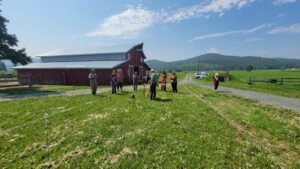
Provide education to the public on the basic principles of Soil Healt
June 10, 2023 on a private ranch north part of Stevens County and September 9, 2023 at the Vetter Farm, south part of Stevens County.
Craig Madsen regionally respected expert with 30 years of experience ecosystem and range management, Certified Educator in holistic Management, works with regenerative agriculture and soil health. Facilitated a 2 1/2 hour in field workshop at no cost to the public. See attached flyers.
Attending landowners received hands on training looking at soil characteristics and discussion on evaluation, management practices. There were small groups and there was time to discuss individuals' questions and site-specific concerns. Pits were provided to see and evaluate the different layers.
14 attended the north County event in June
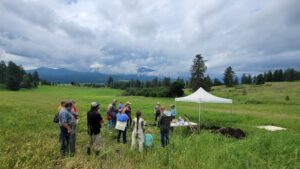
16 attended the Vetter Farm event in September
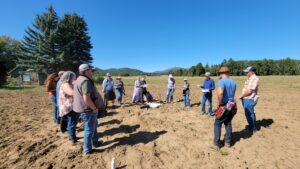
Provide public and livestock producers with some basic information on livestock butchering, direct marketing, livestock budgets, feed and nutrition, and pasture management.
September 23, 2023: Livestock and Field Day: The instruction was excellent; the weather was great. People were engaged and excited to attend great presentations about butchering, direct marketing, livestock budgets, feed, and nutrition, seed bomb making, and more!
Butchering included the processing of a lamb carcass into retail cuts and the demonstration of butchering of live chickens.
Livestock management included grazing practices including rotational and regenerative agriculture practices to improve soil health to improve plant and animal health and production. WSU extension economist discussed budgeting and there was a extension agent talking about ruminant Livestock nutrition.
In addition to the SARE Producer grant additional funds were provided by Conservation Commission Implementation and Livestock technical assistance grants and WSU Stevens County Extension.
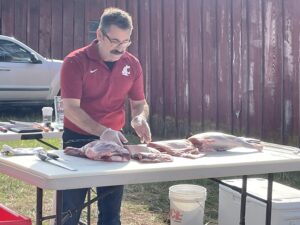
The field day was attended by about 80 people representing Stevens, Spokane, and Pend Oreille counties. We also had folks from Northern Idaho and even a gentleman who came up from Colorado specifically for this event, making this a regional achievement. Most of the attendees were new to farm ownership and management this gave them additional knowledge to help grow their operations.
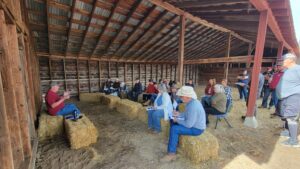
Educational & Outreach Activities
Participation Summary:
Workshops, meetings, field days and tours (EVENTS) was a major component of this project. These events provided education and communicating for the region’s landowners and service providers in the realm of soil health and regenerative agriculture. In the beginning there was a reliance on local information with producers sharing their research, thoughts, and practical experience in a setting where traditional farmers were not judging. Finishing out the project with a winter workshop where a recognized national expert in the regenerative agriculture and cover cropping was the keynote speaker and still having a local producer Q&A panel. The grant sponsored of 13 events, and 450 producers attending in addition to having information on many other events in the region. The first couple of events with an average of 20 and the final field day having 80 attendees. These Events are not ending with this project, future events are being planned.
There were many more events the Conservation District sponsored and participated in and flew the SARE banner at to promote interest in the SARE RGR20-005 program and soil health. For example a local fertilizer and seed dealer hosts an annual producer meeting which we attended.
Learning Outcomes
Project Outcomes
This project increased the knowledge and promoted the adoption of soil health practices at the grass roots level in Northeastern Washington. For the past 3 years, 2020 through 2023 Stevens County Conservation District (SCCD) worked with local landowners, commodity groups, agricultural businesses, state, and federal natural resource agencies through the SARE RGR20-005 grant to achieve those goals. There were some setbacks with Covid-19, a significant drought in the region and almost all entities partnering on the project experiencing staff changes. The landowners were steady, and all had a positive experience with the workshops, networking, and research/demonstration projects.
The Soil Health Stewards (SHS) group which was already formed in 2018 were primary drivers for the grant application. SHS did see a significant increase in membership that exceeded their goals, starting with 10 members, there were 67 in 2022 and well over 100 at the end of 2023. Many topics are covered by this group sharing information articles, contacts and the development of a farm equipment share list which is still evolving, there is large demand for a no-till drill.
Research/Demonstration was also part of this project. Approximately 25 landowners worked with SCCD on planning and researching potential projects. Many moved forward on their own and relayed information back to the SHS group or discussions at workshops or tours. We did have 8 landowners develop a more formal plan and implement followed by soil testing to compare the test field to a control. The focus was in two categories -- Bale Grazing 4 projects with a total of 49 animal units, feeding 147 ton of feed on 11.2 acres. This was very successful and many more landowners are interested in feeding out in the fields instead of small pens or in feeders. Still a few more challenges some not considered in these project but a regional concern is preditors in the area.
Cover cropping during permanent crop re-establishment with 5 landowners 7 fields and 83 acres. This was not as susceeful as the Bale Grazing weather conditions etc. short growing season struggles to produce profitable crops and not having the window to double crop, more experimentation needs to be done in the area.
In 2020, a typical small family farm of Northeastern Washington was donated to Washington State University (WSU). Working with SCCD/WSU and others, several soil regenerative practices for demonstration at this community, demonstration, and research farm. Two projects were implemented in 2022 and 2023, there is a permanent Western SARE sign on one of the fields as the projects continue.
A small-scale beef cattle rancher in northern part of Stevens County was struggling to keep the operation going. For many years his operation was running 18 mother cows. This was on 86 acres of owned ground, renting pasture ground and purchasing hay to feed for the winter. This area of the county is heavily forested with small openings 4 to 10 acres on average as meadows and farmable ground most of which is used for production of hay as winter forage. Increasing costs to rent pasture, purchase hay in addition to several long winters and dry summers caused this operation to cut back on expenses and animal numbers. By 2019 the operation was down to 5 mother cows and was considering completely quitting the livestock business. This was a difficult decision because there is still a passion to raise cattle.
After learning a little bit about regenerative agriculture and soil health practices there was a renewed interest in working with the soil to improve forage production and keep the cattle. Starting in 2020 the ranch planted one of the grass hay fields to an annual small grain crop (beardless barley) grazed it in the fall. Then fed the cows and couple horses on part of the field for the winter. The operation was so impressed the success of that project. The next year the process was repeated seeing even more improvement in forage production and requiring less hay to be purchased. By the 3rd year they started adding additional species to the cover crop like peas turnups, sunflowers, canola and inoculating the seed with vermiculture tea. The operation was able to add three more cows to the herd, and the owner is sold on cover crops. The ranch is promoting the practices to his neighbors and participating on producer panels at regenerative agriculture workshops.
This was a great and well needed project for this area and much more work needs to be done. There is discussion among some of these projects participants to look into the next level of SARE grants for producers and producers working with researchers.
As mentioned in the summary our cover crop projects were not a huge success especially with the smaller higher elevation producers. We are preparing to work with WSU and submit future project proposals.
Currently we have a large demand for information on Virtual fencing and have submitted a proposal in partnership with Washington State University to demonstrate the practice on the Vetter Farm.
